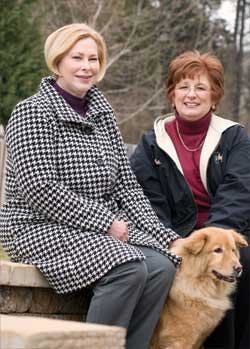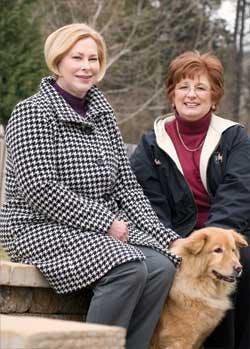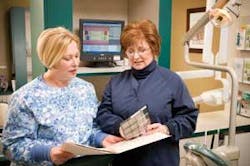Mentor of the Year
Philips Sonicare and RDH magazine have announced the 2008 Mentor of the Year, Mary Semancik of Herndon, VA. Semancik's hygiene experience includes jobs in Europe and Alaska, and her mentoring experience includes helping a re-entry hygienist, and encouraging an assistant to go to hygiene school.
by Cathy Hester Seckman, RDH
Many hygienists dream of working abroad after college, but not many follow the dream through to reality. Mary Semancik got to Europe, but it was a bit of a long and winding road.
"While I was at Western Kentucky University, two of my sorority sisters applied to the dental hygiene program but didn't get in because the grade point average was set at 3.8. I'd always wanted dental hygiene as a career, but I just put that on the back burner and minored in business. When I got to be a senior, I hadn't chosen a direction yet. My dad said I'd better come up with something fast, so I decided on recreation, because that was the only major I could find that would let me graduate in four years."
After college, Mary got a job as a tour guide at Kentucky Horse Park and lived in an apartment across the street. But she couldn't stop thinking about dental hygiene. "I found the idea fascinating and challenging, and the profession seemed to be well respected.
"I looked into the University of Kentucky program at Lexington Technical Institute (now Lexington Community College). They had a requirement of 1,000 hours of observation in a dental office before applying to the program. So I got a night job at a retail store to pay my rent, and worked for my family dentist, Dr. Carpenter, for free for three months, just to be competitive with the dental assistants applying."
"My interview at LTI went well, and I did well on the aptitude test. There were 120 applicants for 16 openings, and I got in. It was a great program, because at the time they had a grant to teach an expanded duty program along with hygiene. I continued to work for Dr. Carpenter as a paid assistant, and was able to quit my night job. I graduated with an associate degree in 1983."
While in hygiene school, Mary read an article about U.S. hygienists working in Switzerland. "To qualify, you had to be single, under 30, and have two years of work experience. So as soon as I'd put in my two years as a hygienist, I headed for Switzerland. I lived in Zurich for two years, and worked in two different offices. I learned to do a dental appointment in German, and I learned a lot about root planing there. The patients were on one-year recall, so they gave me lots of experience."
Mary also met her husband, Karl, while living in Europe. He was stationed in Heidelberg with the U.S. Army, but shortly after the couple met, he was posted back to Virginia. "I wanted to stay in Switzerland, so we had to decide whether to stay together. I guess we made the right decision, because 20 years later, our marriage still works."
Mary obtained a Virginia dental hygiene license and worked there until Karl was relocated again.
"We moved to Fairbanks, Alaska, when I was seven months pregnant. It took us three weeks to drive up there from Virginia, and it was a wonderful experience. We lived in a log cabin and did a lot of skiing. I loved it, it was great."
Local anesthesia was legal for hygienists in Alaska, so Mary and several other Fairbanks hygienists took the DH270 anesthesia course by video conference from the University of Alaska in Anchorage. They went to Anchorage, a 360-mile trip, for the final week of clinical practice. They sat for the anesthesia portion of the Western Regional boards, and were certified for local anesthesia. Mary did not have to take the entire board exam because of reciprocity with the Southeast Regional Board, which had licensed her in Kentucky and Virginia.
After the Alaska tour of duty, the family lived in Virginia again for two years, then moved to Belgium for three years for a NATO assignment. Mary didn't work there, but was a volunteer at her son Kas's school, teaching the little ones about teeth and oral health. "It was a little hard for the locals to understand, because dental hygiene (as a profession) doesn't exist in Belgium."
The next move was to Germany, where Mary worked for Dentac, which provides dental services to the U.S. military. After two years there, the family returned to Virginia. Karl retired from the military, and now works for Anser as a Homeland Security consultant.
Helping Someone Else On the Road Back
One of her first jobs in Virginia was for Dr. Liz Cristofano, and one responsibility there was helping to hire a new hygienist. That's how she met Pam Walters, who nominated her as the 2008 Mentor of the Year.
Pam had not worked in hygiene for 24 years due to family moves and fear of taking a clinical board. Her three sons' desires to go to Penn State University helped motivate Pam to take the Virginia board and re-enter dental hygiene as a career. She was nervous about interviewing for a position and learning the computer system, but Mary was there to help.
"After showing me their office," Pam recalls, "Mary had the final say in hiring me. Mary not only gave the dentist the go-ahead to hire me, but she took me under her wing to quickly get me up to speed. I was so grateful for her guidance and advice.
"Mary never made me feel dumb about any question I asked. She taught me how to take a Panorex. She taught me about the changes in infection control. She showed me how to clean a film developer, make in-house night guards and bleaching trays, and many other things that I had no experience with. I was quite nervous about doing scaling and root planing, and she willingly guided me through my first few cases, helping me to become confident in my abilities. I love hygiene now, and it's because of Mary's enthusiasm and mentoring."
Pam is not the only hygienist Mary has mentored. Emily Smith, a family friend, was majoring in education when Mary suggested that Dr. Cristofano hire her as a dental assistant. Mary says, "She seemed so bright, and I thought she would fit in with our office rather well. After working with her for awhile, I suggested that she change (her major) to dental hygiene. She opted to get the four-year degree, and then pursue dental hygiene. She is now our component vice president, and arranges the monthly CE meetings."
A Love For The Profession
It's important to Mary that other hygienists love what they do. "I feel bad when people don"t want to go to work. You've gotta love what you do, or you won't last. Sometimes I see articles in our component newsletter – do you need motivation? That never applies to me. I love what I do, and I feel so blessed. I want to go to work every day. My husband always jokes that if we won the lottery, he'd quit and I'd still work."
Mary now works 5-6 days a week for general dentist Mark Jeffries, DMD. "I tell my patients, ‘I have no life. I"ve been doing this for 25 years, and this job is all I have, so you have to floss.""
She does volunteer for her son"s sports teams, often working the concession stand. "Kas has more of a life than I do," she jokes. Mary is also active in her local ADHA component. "I'm not a major player, but I try to go to the board meetings and give my opinion. I've moved around a lot, and I know how other states do things. Some hygienists don"t realize we can do more. I feel like I have a different voice, especially concerning boards and licensing. It's so frustrating to think that local anesthesia is still not technically legal in Virginia, because there's no way to teach it. It doesn't make sense – step across a state line and, ‘Oh, no, you can't do that anymore."
Mary is also the fundraising chairman for her component. "I find things for us to sell at meetings, and we set up a table. We usually give the money to VHy-PAC (the Virginia DHA"s political action committee)."
Pam had more to say on that subject. "Mary makes it sound small, but it's a major contribution. She has to order all that stuff, and cart it around to meetings. It's a big job. Mary's very modest. I had to convince her she deserves this award."
Mary does have trouble realizing that she's been named a Mentor of the Year. "When they called, all I could say was, ‘Are you sure?" I had reservations at first; I couldn't believe it. When you think of a mentor, it's of someone who's a teacher, a person who has won other awards, and given speeches, and written articles. I'm just an everyday hygienist."
That's certainly true, but Mary, in her everyday life, fulfills the most important job of a mentor; making life easier, making it better, making it more fulfilling for her fellow hygienists.
About the Author
Cathy Hester Seckman, RDH, is a frequent contributor based in Calcutta, Ohio. Besides working in a pediatric dental practice, Seckman is a prolific freelance writer, a book indexer, and a speaker on dental and writing/indexing topics. She can be reached at [email protected].


